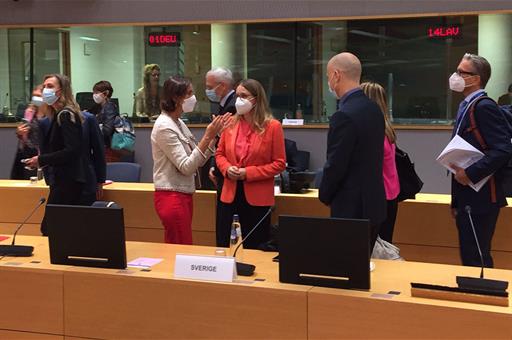Competitiveness Council in Brussels
Reyes Maroto calls on the European Commission to speed up instruments to boost semiconductor manufacturing in Europe
News - 2021.9.29
For this reason, the minister has asked the European Commission (EC) to speed up the necessary instruments to boost semiconductor manufacturing in Europe.
The minister also conveyed this request to the Vice-President for Inter-institutional Relations and Foresight of the EU, Maros Sefcovic, and to the Director General of DG Connet, Roberto Viola, with whom she held meetings during her visit to Brussels.
Maroto has valued the measures announced by the Commission, such as the European Chip Law as positive, but has requested a boost from the EC to guarantee the supply of these essential components in order to recover vehicle production levels in European and Spanish factories. The semiconductor shortage is a problem that affects the entire European automotive industry and requires, first of all, immediate action such as facilitating internal flexibility in companies through ERTEs that have been a very successful measure during the hardest months of the pandemic. But also structural actions to increase production capacity in Spain and in Europe.
The Minister for Industry recalled that in the first Strategic Project for the Recovery and Transformation or PERTE Spain has included financial support for the manufacture of semiconductors in Spain, in the field of the electric and connected vehicle value chain. The electric vehicle PERTE will involve a public investment of 4.295 billion euros in 2021-2023 to boost the industrial climate and ensure that Spain creates the necessary ecosystem for the manufacture of electric and connected vehicles.
Maroto explained to her partners that this PERTE will contribute to strengthening the strategic autonomy, modernisation, decarbonisation and digitalisation of the Spanish and European automotive sector, while at the same time taking a step forwards in fulfilling the commitments made by Spain and the European Union to climate neutrality by 2050.
During her two-day trip to Brussels, Maroto also had the opportunity to defend Spain's proposal to create a European platform to facilitate the purchase of natural gas in order to lower the high electricity prices that affect energy-intensive industries. Spain suggests that strategic reserves could be built up to avoid exposure to market fluctuations.
Reyes Maroto recalled the measures adopted by Spain to reduce electricity bills, such as tax reductions and the commitment to new renewable energy auctions. For the minister, this is a strategic issue, especially for the electro-intensive industry. This sector already receives aid to be competitive, such as compensation for CO2 emissions or compensation for the extra cost of premiums for renewable or extra-peninsular energy.
Spain has sent a letter to the European Commission to coordinate a common response to the increase in electricity prices on the wholesale market. The letter, signed by ministers Calviño and Ribera, was sent to Vice-President Frans Timmermans, Competition Commissioner Margrethe Vestager and Energy Commissioner Kadri Simson.
Non official translation





